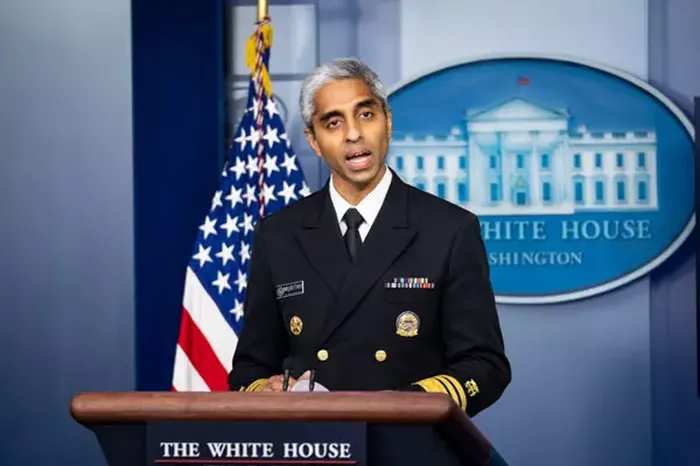In a pointed interview aired Sunday on NBC’s Meet the Press, former U.S. Surgeon General Vivek Murthy sharply criticized Congress for not taking action to protect children from the mental health harms linked to social media.
Murthy, who served under both the Obama and Biden administrations, said lawmakers have “failed in their responsibility to protect our kids.” He called for immediate legislative steps, urging Congress to add warning labels on social media apps and to require platforms to share more data with researchers.
The former surgeon general compared the current situation to a time before cars had seat belts or traffic laws.
“We’re basically putting our kids in cars with no seat belts or air bags, and having them drive on roads without speed limits or traffic lights,” Murthy said. “That is just morally unacceptable.”
Congress has made attempts to regulate social media, especially regarding how these platforms interact with children. Last year, the Senate passed two key bills — the Kids Online Safety Act (KOSA) and COPPA 2.0 — with strong bipartisan support.
However, both measures stalled. COPPA 2.0, which aimed to update a 1998 law by raising the age limit for data collection from 12 to 17, faced backlash from advertisers. It also included limits on how third-party companies could target kids under 17.
KOSA sought to make social media companies legally responsible if their content harmed children’s mental health. Critics, including civil liberties groups, warned that companies might go too far in censoring content to avoid lawsuits. As a result, neither bill received a House vote.
Earlier this month, Senate Majority Whip John Thune (R-S.D.) and Senate Majority Leader Chuck Schumer (D-N.Y.) reintroduced KOSA, signaling a renewed push.
Murthy, who authored the book Together: Why Social Connection Holds the Key to Better Health, Higher Performance, and Greater Happiness, also tied social media use to a growing loneliness crisis.
He explained that while children appear connected online, these digital interactions do not replace real-life relationships.
“Kids are spending time on social media, but they’re not building the in-person friendships we all need,” Murthy said. “That leads to deeper loneliness and isolation.”
Murthy added that chronic loneliness can have serious health consequences, including higher risks of heart disease and inflammation.
“When loneliness becomes chronic, it increases inflammation in our body and can shorten our lives,” he said.
Murthy emphasized that children are especially vulnerable to social media’s downsides because their brains are still developing.
“They are more susceptible to social comparison, peer pressure, and have less impulse control,” he explained. “This makes them more at risk of mental health harm from social media use.”
He also noted that many young users are caught in a cycle of self-comparison online, which damages self-esteem.
“Many kids are trying to be someone they’re not,” Murthy said. “That’s making it harder for them to build real-life connections and friendships.”
Former Congressman Patrick Kennedy, a longtime mental health advocate, joined Murthy on Meet the Press and echoed his concerns. He said the government has not done enough to address the growing mental health crisis among youth.
“Our country is failing in its role as a guardian of our children’s future,” Kennedy told host Kristen Welker.
Kennedy proposed the creation of a national prevention fund to help identify and support at-risk youth early on.
“If we really want to improve outcomes, we need to invest in prevention,” he said. “Let’s pool federal and state resources to create a fund that targets those most at risk before problems get worse.”
Kennedy also urged reforms in how mental health care is reimbursed and delivered, saying the current system is too complicated and reactive.
Both Murthy and Kennedy stressed the urgency of the issue. They warned that inaction could leave a generation of children struggling with the long-term consequences of unchecked online exposure.
Murthy concluded with a clear message: “Congress must act now. Our children can’t afford to wait.”


